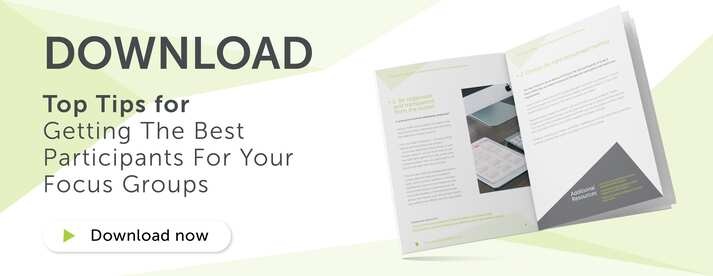
Why Conduct Focus Groups as a Research Method?
Focus groups are one of the most widely used and effective qualitative research methods. They provide in-depth insight into customer attitudes, behaviours, and motivations — all gathered through facilitated, open-ended group discussions.
But what exactly is the focus group research method, when should you use it, and what are the benefits? Let’s explore.
What is a focus group research method?
Focus groups are informal, loosely structured interviews conducted with a small group — typically 8 to 12 participants. Led by a trained moderator, participants are asked to focus on a specific topic and take part in a free-flowing discussion about a product, service or concept.
This method is ideal for uncovering thoughts, feelings, and attitudes that might not emerge through more rigid or quantitative methods. If you're planning to moderate a session yourself, take a look at our top 10 moderating tips for successful focus groups.
Why understanding your customers matters
What kind of people are your customers? How do they live, think, and talk? What motivates them — and what might stop them from engaging with your brand?
These are exactly the kinds of questions that focus groups help you answer.
You may already have a demographic profile — age, income, location, occupation, household details — but this data alone is often too static. It tells you who your customers are, but not why they buy your product or how they see themselves in relation to your brand. Qualitative research brings these insights to life.
Qualitative vs quantitative: why focus groups come first
These observations often cannot easily be formalised and packaged into quantitative studies. Qualitative research allows us to see in consumers what they themselves may not be aware of and, therefore, what they cannot report in straightforward questioning. In addition, what is important and relevant in one category (how people dress or their energy level, for instance) may be meaningless in another.
We have to be open and receptive while observing respondents: What stands out about these people? What is the dominant feeling and impression they leave behind? The answer is to consider what comes out of qualitative research as hypothesis, not absolute fact. The new picture of the consumer is a possibility to consider and to explore further through quantitative studies with larger samples and structured questionnaires.
What are the benefits of using focus groups?
Focus group research methods are an excellent method for gathering in-depth information about customer attitudes and opinions regarding the use of a company’s product or service. The weakness of conducting focus groups is that they use a statistically small sample size population and the attitudes and opinions expressed by a single or a few focus groups may not be representative of the population as a whole. Although focus groups may only represent a statistically small sample size of a population they offer these additional benefits:
- Insights that go beyond a list of demographics, attitudes, and behavior.
- Excellent for gathering information regarding customer attitudes and opinions and learning exactly how internal and external customers use your work, products and services
- Provide fast turnaround time for acquiring knowledge
- Relatively inexpensive to conduct and can generate a great deal of customer information
- Can uncover unsuspected problems and solutions
- Useful when information is needed but cannot be collected adequately with questionnaires, interviews, or quantitative methods
That said, managing attendance is key — read more about why over-recruiting in focus groups matters.
-Jun-12-2025-02-51-33-9444-PM.png?width=1200&height=628&name=Untitled%20design%20(3)-Jun-12-2025-02-51-33-9444-PM.png)
When should you conduct a focus group?
Identifying your market
The most successful products and services meet a real customer need. But there are times when your company is not completely clear on what that market actually is. Focus groups allow you to identify your target market, providing you with much-needed information related to both product development and marketing.
This is why so many companies choose to use focus groups early on. While the qualitative data gathered from these efforts is not adequate to inform decision making from the beginning to the end of a project, it is excellent for helping orient the initial trajectory. Qualitative data is useful for making strategic decisions, due to the bird's eye view it provides. Once it is time to make more specific decisions at a tactical level, the benefits of quantitative data become more pronounced.
New product development
New product development is an ongoing challenge for any company. While success in this area can yield a new surge of profitability, achieving that success can sometimes feel like grasping around in the dark without a light. Focus groups, and the qualitative data they provide, can help guide the way.
You can use focus groups in a variety of areas in the new product development state, including concept testing, packaging testing, product usage tests and test market research. In each of these areas, focus groups give you the ability to test the waters before you fully commit to an idea. This can lead to considerable cost savings, and the avoidance of seemingly promising but ultimately disastrous product development choices.
Perfection of a new product before it goes to market should always include the ample use of quantitative data, but before you invest in the gathering of this data, you can use relatively inexpensive focus groups to determine where that money can best be spent. The speed and affordability of focus groups makes them an obvious front line solution for new product development.
Need help engaging participants effectively? Check out our top focus group task ideas.
Ad campaign development
Advertising is a major investment — and focus groups are a powerful way to test if your message hits the mark before launching.
A message created in a boardroom won’t necessarily land with your audience. Focus groups help you assess reactions, both verbal and non-verbal, to different creative directions. You’ll see what resonates, what falls flat, and what might need tweaking — long before you commit to a full campaign rollout.
Final thoughts
Focus group research remains one of the most valuable tools for exploring customer needs, testing ideas, and shaping strategy. It’s quick, cost-effective, and deeply insightful — especially when combined with quantitative follow-up.
Want to improve your next focus group session? Download our free guide with top 10 tips to help you get the most from your research.














